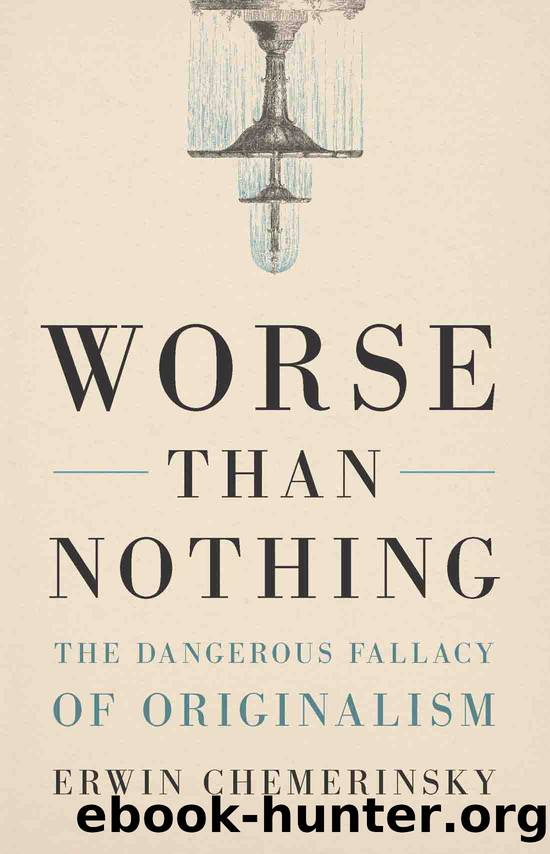Worse Than Nothing: The Dangerous Fallacy of Originalism by Erwin Chemerinsky

Author:Erwin Chemerinsky [Chemerinsky, Erwin]
Language: eng
Format: epub
ISBN: 9780300259902
Google: vWZ4EAAAQBAJ
Publisher: YaleUP
Published: 2022-09-06T22:08:34+00:00
The Growth of Society and Government
In 1790, when the first census was taken, there were 3,893,635 people in the United States. The most populous state, Virginia, had 747,610. The total federal budget was about $640,000.27 In 2021, the United States population is 331,449,281. The population of California is 39,466,917. President Bidenâs proposed budget for fiscal year 2022 is $6 trillion. Put another way, the population of the United States is about one hundred times larger than in 1787. The federal budget is vastly larger. In 1787 there were thirteen states, all on the East Coast. Now the country stretches across the continent and includes Alaska and Hawaii, as well as places as far as Guam.
It is absurd to define the powers of government from the perspective of the original meanings of 1787. The Framers could not have imagined a country as large physically, as populated, or as complex as the United States in 2021.
The need for federal government activity exists on a scale that could not have been conceived when the Constitution was written. A crucial example of that is federal administrative agencies. Although agencies and departments have existed in some form since the beginning of American history, it is only since the late nineteenth century, with the creation of the Interstate Commerce Commission in 1887, that Congress has routinely delegated broad legislative power to executive agencies. Over the next century, Congress created a vast array of federal agencies, including the Federal Communicatons Commission, the Securities and Exchange Commission, the Food and Drug Administration, the Environmental Protection Agency, the Nuclear Regulatory Commission, and many others. Itâs important to remember that all of these agencies were created out of public need: the Interstate Commerce Commission was needed to rein in the rapacious business practices of railroads and other firms exploiting the countryâs rapid and massive expansion, the Securities and Exchange Commission to prevent Wall Street from precipitating another Great Depression, the Environmental Protection Agency in response to increasing public alarm about pollution and other environmental damage.
The Constitution does not expressly mention such agencies, and in many ways they are in tension with basic constitutional principles. It is questionable, from an originalist perspective, whether they are constitutional at all. Virtually all of them possess rule-making power, and their rules have the force of law. This seems to conflict with the notion that Congress alone possesses the federal legislative power. Yet there are many reasons why Congress has delegated broad legislative power to administrative agencies. The technical and legal complexity of many areas creates a need for complex regulations that are better handled by a specialized agency than by Congress. The sheer quantity of regulations exceeds Congressâs capacity to manage. There is also a political dimension: delegating legislative power to administrative agencies allows Congress to avoid the political heat that some regulations might engender.28
Administrative agencies, however, do not possess only legislative power. They also have the executive power to enforce the regulations they have promulgated and the judicial power to adjudicate violations of their rules.
Download
This site does not store any files on its server. We only index and link to content provided by other sites. Please contact the content providers to delete copyright contents if any and email us, we'll remove relevant links or contents immediately.
The Secret History by Donna Tartt(19086)
The Social Justice Warrior Handbook by Lisa De Pasquale(12190)
Thirteen Reasons Why by Jay Asher(8909)
This Is How You Lose Her by Junot Diaz(6886)
Weapons of Math Destruction by Cathy O'Neil(6279)
Zero to One by Peter Thiel(5801)
Beartown by Fredrik Backman(5754)
The Myth of the Strong Leader by Archie Brown(5507)
The Fire Next Time by James Baldwin(5442)
How Democracies Die by Steven Levitsky & Daniel Ziblatt(5218)
Promise Me, Dad by Joe Biden(5153)
Stone's Rules by Roger Stone(5087)
A Higher Loyalty: Truth, Lies, and Leadership by James Comey(4962)
100 Deadly Skills by Clint Emerson(4925)
Rise and Kill First by Ronen Bergman(4788)
Secrecy World by Jake Bernstein(4753)
The David Icke Guide to the Global Conspiracy (and how to end it) by David Icke(4717)
The Farm by Tom Rob Smith(4507)
The Doomsday Machine by Daniel Ellsberg(4490)
